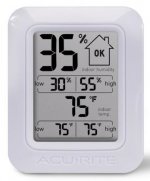Humidity and your home
If you purchased a home with me, you are sure to have heard me tell you that water is your biggest enemy, as it can cause damage to your home and your health. The next enemy after water, is moisture in a home. Hence, it is critical to control humidity in the home, else high levels of humidity can cause mold and mildew growth, among other problems. When moisture is combined with warm temperatures, this growth attracts insects including dust mites, causing allergies in most people. The main causes of increased humidity in a home are: showers/tubs, clothes dryers, and, vapor from cooking. Other contributors are: plumbing leaks, poor ventilation, and gaps causing openings from the exterior into the home. If not controlled, high levels of moisture over time can lead to musty odors, mildew/mold, and, wood rot which can affect the structural integrity of your property.
The easiest way to measure the humidity in your home is with a temperature & humidity meter, which costs between $8-20, and can be purchased: on line, in a hardware or home improvement store. The EPA, recommends keeping indoor humidity between 30-60%, which will help reduce mold growth in your home. For this reason, it is best to dry wet areas as well as to dry off condensation, many times which can be found on windows, behind blinds and curtains.
It is highly recommended to use exhaust fans to ventilate bathrooms while bathing and to leave on for 30 minutes afterwards while keeping the bathroom door closed. Check after each use the laundry to ensure there are no washing machine leaks via the machine or hoses, as well as ensure that the dryer lint tray is cleaned regularly as well as its exhaust vent. The kitchen exhaust hood should be cleaned regularly to vent correctly vapor to the exterior.
In this area of the country our summers come with high levels of humidity and make their way into the home typically thru the basement. So, dehumidifiers can be used effectively to reduce high levels of humidity in the basement. Make sure that the basement temperature is not too cold (ideally 68F or higher), else the dehumidifier may ice up. Make sure you obtain one that can work for the cubic area of your basement.
Once you seal off any potential ways in which humidity can enter the home, maintain and use the exhaust vents properly, dry up any wet areas promptly, use a dehumidifier as needed, you should be able to enjoy a safer home with better air quality.
For help on maintaining your home in good condition, please select here the
Stay healthy and safe!
